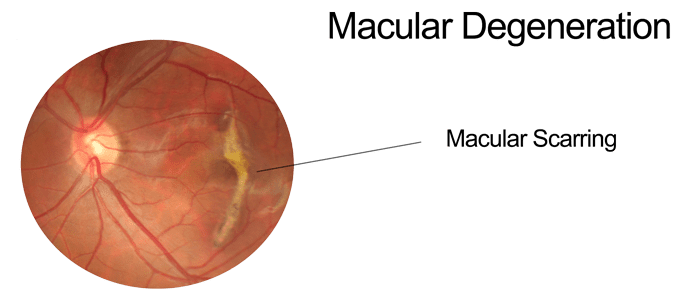Types
Macular Degeneration can be classified as either wet (neovascular) or dry (non-neovascular). Dry Macular Degeneration is more common, and is considered to be an early stage of the disease. It usually develops as a result of aging, with thinning of macular tissues and the depositing of pigment within the macula.
Only about 10% of patients see their condition progress to the more advanced and damaging wet macular degeneration. In wet macular degeneration, new blood vessels develop beneath the retina and cause a leakage of blood and fluid. This leakage can lead to permanent damages in the central vision and the creation of blind spots. Although less common, wet macular degeneration accounts for 90% of the blindness caused by all cases of this condition.
Symptoms
Patients with macular degeneration may notice gradual changes to their vision, including shadowy areas in the central vision, or fuzzy and distorted vision. These areas grow larger as the disease progresses, and can eventually turn into blind spots. Patients may also have difficulty seeing color and fine details.
If the disease progresses to the wet form, patients may also see straight lines as wavy. With wet macular degeneration, central vision loss can occur rapidly, sometimes in as little as a few days or weeks.
At Florida Eye Specialists and Cataract Institute, we’re able to detect early signs of macular degeneration through a regular eye exam, before any symptoms occur. We can confirm any signs of the condition by testing your central vision with an Amsler grid test. Regular eye exams help detect serious eye conditions such as Macular Degeneration as early as possible, and avoid more permanent effects.
Causes and Risk Factors
Most cases are a result of aging and the natural deterioration of the eye tissue that is needed for clear vision. This disease is also related to a genetic factor in patients who have a gene variant known as complement factor H with nearly half of the blinding cases linked to this genetic indicator.
It is most common in females and whites, and the risk for all patients increases with age. This disease is the leading cause of blindness in the U.S. for patients over the age of 65. Over 14% of adults between the ages of 70 and 79 have been diagnosed with advanced or intermediate age-related Macular Degeneration. This equals 1.75 million people, with the number expected to grow to almost 3 million by 2020.
Other factors that may increase your risk of macular degeneration include:
- Obesity
- Smoking
- Heredity
- High fat diet
- Prolonged sun exposure
- High blood pressure
- Lighter eye color
- Side effects of certain drugs
You can minimize your risk of macular degeneration by practicing a healthy, active life and getting regular eye exams. Exercise regularly, avoid smoking, and eat a balanced diet that includes foods known to preserve vision and prevent eye diseases. Your doctor at Florida Eye Specialists and Cataract Institute will be glad to give you prevention guidelines and helpful information.
Treatment
While there is no cure for Macular Degeneration, several treatment options are available to help manage this condition and preserve your vision. Your doctor can help select the best treatment options, depending on the severity and type of the condition, as well as how much, if any, permanent vision loss has occurred. At Florida Eye Specialists and Cataract Institute, we have a wide variety of solutions, from cutting-edge drugs to state-of-the art therapies.
Intraocular injections of Avastin, Lucentis and Macugen are often successful in stopping abnormal blood vessel growth in Wet Macular Degeneration. These FDA-approved medications help control the damaging effects of Wet Macular Degeneration. Photodynamic therapy (PHD) is also effective in removing newly developing abnormal blood vessels that are characteristic of Wet Macular Degeneration. Many patients benefit from vitamin and mineral supplements, which can clear out toxic substances that may build up in advanced cases of this condition.
Get a comprehensive eye exam annually
Minimize your risk of vision loss from Macular Degeneration by scheduling a comprehensive dilated eye exam once a year to detect any signs as early as possible.



